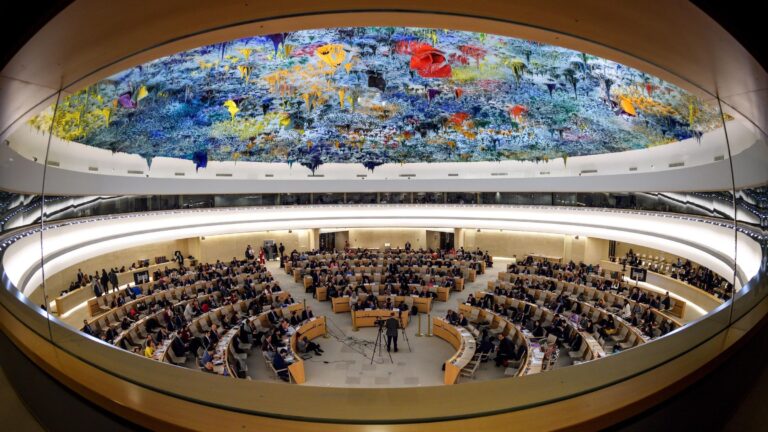
The United Nations Human Rights Committee has recently published its final observations and recommendations to the Kingdom of Spain following its review of Spain’s implementation of the International Covenant on Civil and Political Rights (ICCPR) during the Committee’s 144th session (23 June – 18 July 2025). The Committee expressed concern over the lack of implementation of previous recommendations regarding Catalonia, as well as ongoing issues such as hate speech, excessive police violence, and the chilling effect of surveillance activities on the rights to freedom of expression, association, and assembly. The UNPO and the ANC submitted information on the situation in Catalonia to help inform the Committee’s assessment.
Below is an overview of the key findings and recommendations made by the Committee in relation to Catalonia, highlighting the main concerns identified during the review:
Non-implementation of earlier recommendations
Firstly, the Human Rights Committee expressed concern over the lack of implementation of previous opinions it has adopted, including in the cases of Junqueras et al. v. Spain and Puigdemont v. Spain. In both cases, the Committee found that Spain had violated the rights of the defendants and called for preventive measures and follow-up reporting.
The Committee reiterates Spain’s obligation to take all necessary measures to implement its concluding observations, as required under the Optional Protocol to the ICCPR, to which Spain is a party. It further encourages the establishment of an effective mechanism to provide adequate financial compensation to victims.
Hate speech and Hate crime
Furthermore, the Committee draws attention to the increase of hate speech, particularly those of a neo-fascist kind, and hate crimes against various societal groups, including the Catalans. It emphasizes the need for the Spanish State to strengthen its efforts to combat hate speech and hate crime, including by ensuring thorough investigations into every case and providing effective remedies for victims..
Excessive police violence
Besides violent attitudes in society, The Committee additionally points at the use of excessive police violence during the protests in Catalonia in October 2017 and regrets the limited progress of investigations to this behaviour, and lack of effective accountability of those responsible. The Committee urges the Spanish authorities to respect the principles of necessity and proportionality with regards to the use of force and to investigate any case thoroughly, impartially, while ensuring the penalization of those responsible and the allocation of reparations to victims as appropriate.
Legal provisions jeopardizing freedom of expression
Moreover, The Committee voices its concerns about the lack of measures taken to decriminalize defamation and insult. It is particularly concerned about article 578 of the Penal Code and its criminalization of, among other things, the ‘glorification of terrorism’ and certain provisions on the protection of citizen security and the imposition of administrative sanctions. The Committee highlights how these provisions can have a chilling effect on the legitimate exercise of the rights to freedom of expression, association and assembly and might be used to prosecute individuals for exercising those rights. The Committee calls on the Spanish authorities to consider the decriminalization of defamation and urges that article 578 of the Penal Code ought not be used to restrict the fundamental rights laid down in the ICCPR.
Disproportionate and unnecessary surveillance and the official secrets act
Lastly, the Committee expressed grave concerns about the Spanish police and intelligence services surveillance activities targeting human rights defenders and other civil society actors which could have a chilling effect on the rights to freedom of expression and peaceful assembly. Particularly, the Committee refers to the use of Pegasus and Candiru spyware against at least 65 Catalan politicians, activists and public figures, between 2017 and 2020. The Committee also highlights the absence of an official investigation into the matter.
Secondly, the Committee refers to the infiltration of undercover intelligence agents in social groups outside of criminal proceedings which have been carried out without any legal safeguards or judicial oversight. These infiltrations are protected by the 1968 Official Secrets Act. The Committee urges the Spanish authorities to revise the 1968 Official Secrets Act and to ensure that any use of surveillance methods strictly respects the principles of legality, necessity and proportionality. Moreover, The Committee emphasizes the importance of exhaustive, impartial and effective investigations into cases of illegal surveillance and the allocation of reparations to its victims.
Finally, while the Committee addressed a broad range of rights concerns, it notably did not reference Spain’s violation of Article 1 of the ICCPR (the right to self‑determination) in its concluding observations. The UNPO and ANC notes it’s significant given that many of the other rights violations faced by Catalans stem from the denial of this fundamental right.
The ANC has been a full member of the UNPO since 2019, representing. This collaboration is part of the ANC’s internationalization work, to defend Catalonia’s right to self-determination and denounce internationally the democratic regression and abuses that the Catalan people suffer from Spain.